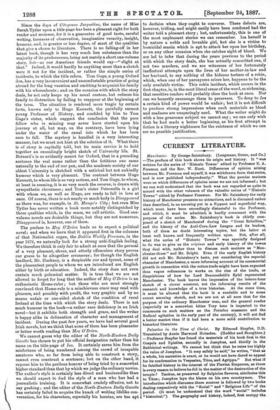CURRENT LITERATURE.
Manchester. By George Saintsbury. (Longmane, Green, and Co.) —The preface of this book shown its origin and history. It "was written for the series of ` Historic; Towns' edited by Professor E. A. Freeman and the Rev. W. Hunt. Differences of opinion arising between Mr. Freeman and myself, it was withdrawn from that series, and is now published independently." What the precise matters were on which differences of opinion arose we are not informed ; but we can well understand that the book was not regarded as quite in accord with the other volumes of the valuable series of "Hietorie Towns" edited by Professor Freeman. For Mr. Saintsbnry the early history of Manchester presents no attractions, and is discussed rather than described, in an amusing yet in a flippant and superficial way, which must have been exceedingly distasteful to the Professor, and which, it must be admitted, is hardly consonant with the purpose of the series. Mr. Saintabury's book is chiefly corn. posed of a sketch of Manchestek daring the "Great Rebellion," and the history of the Anti-Corn-Law League and its leaders, both of them no doubt interesting topics, but the latter at least well known and frequently written upon. Bat, after all, what the series of "Historic Towns" was specially designed to do was to give us the origins and early history of the towns they deal with, rather than to discuss such matters as "Man. chester-them" and Mr. Bright. Even if the early English history did not suit Mr. Saintabury's taste, yet conaiderin the especial character of Manchester, a more informing acconnt of its commercial growth in connection with the cotton trade might have been expected than vague references to works on the rise of the trade, or disquisitions of how far Lord Beaconsfield's Sybil represented Manchester. The book leaves the impression of the leisure-hour sketch of a clever amateur, not the informing results of the research and knowledge of a true historian. At the same time, it must be allowed that the book is a readable and to some extent amusing sketch, and we are not at all sure that for the purpose of the ordinary Manchester man, and the general reader (especially as a somewhat bitter Tory tone is imparted to the comments on each matters as the Peterloo massacre and the Radical agitation in the early part of the century), it will not find a better market than if it had been a more solid contribution to historical literature.


































 Previous page
Previous page